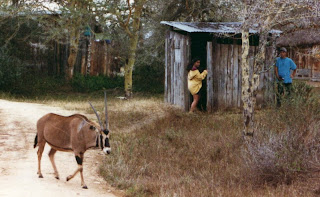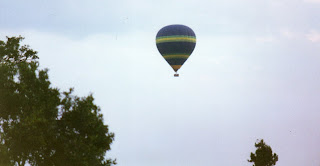During a recent cleaning session in my house I stumbled upon my photo album from an educational trip to Kenya in 1995. I spent five weeks there with 31 other students studying wildlife management with the School for Field Studies. It changed my life.  Sometime after returning I wrote five essays on my experiences and stashed them in the photo album. I had forgotten about them until this past week. They are entitled The Rain, Bright Sun, Night, Simba, and The Rift in the Heart of Africa. Reading them brought back so many wonderful and thrilling memories. I'm posting them here mainly for the benefit of two friends I met there who have become friends for life: Dave and Agnes. Photos were taken by me during my adventure, clicking on them will enlarge them. Enjoy!
Sometime after returning I wrote five essays on my experiences and stashed them in the photo album. I had forgotten about them until this past week. They are entitled The Rain, Bright Sun, Night, Simba, and The Rift in the Heart of Africa. Reading them brought back so many wonderful and thrilling memories. I'm posting them here mainly for the benefit of two friends I met there who have become friends for life: Dave and Agnes. Photos were taken by me during my adventure, clicking on them will enlarge them. Enjoy!
Bright Sun
 Themeda trianda.
Themeda trianda. Red oat grass. This was the first official Latin name I learned during my African summer abroad. I watched the zebras graze on it as our plane taxied on the Nairobi runway. Where wheat wasn't growing, oat grass lined the road all the way to
Jua Kali. Bright Sun. Bright sun, gentle rain and hungry fire all fed this grass, the lifeblood of East Africa. Every herbivore from the tiny
bushbuck to the might elephant eat it. It is the ice cream of the grass realm, although I never tasted it.
I was to stay for four and a half weeks at
Jua Kali, although the
Jua Kali didn't shine every day it was out that first day. Jet-lagged and blinking in the sunlight I gazed in awe at a giraffe that munched at the gates of the ranch owned by a particularly eccentric man named David
Hopcraft. On this ranch lay
Jua Kali, the research station where, although I didn't know it at the time, I would eventually not want to leave.

The ranch raised game for sale, once shot in the cover of darkness and butchered, to local restaurants in Nairobi. Along the short road from the gates to the research station we passed
hartebeest, ostriches, zebras, wildebeest, gazelles and a whole array of creatures all destined to one day be on someones plate. They looked so content in their naivete as they happily grazed on red oat grass, which would only fatten them up more.
Most of the 31 other students assumed we would be allowed to sleep as soon as we were assigned a
banda. This thatched hut would be our home for most of the four weeks in Africa. Every
banda was named after an Swahili animal. There was
twiga (giraffe),
tembo (elephant),
simba (lion) etc. I was to sleep in
nyumbu, which I later learned meant mule. My luck. I'm the one on the left below.

We weren't allowed to sleep of course, but were were fed. One thing that
Jua Kali is blessed with is David. David is a five star chef from Nairobi who tired of the city life. With only a manually lit gas stove and a not-so-reliable pantry he was able to create some of the best cuisine I have ever had anywhere in the world.

Better than any restaurant I have been to in Paris, New York, Boston, Chicago or San Francisco. Yes, right in the heart of the African bush that first morning David fed us banana stuffed pancakes! It was like ambrosia to stomachs that have only had airline food for two days. David was a god-send to students a little worried about not having a McDonald's right down the street. Unfortunately he only did breakfast and lunch. Who was to cool dinner for forty people every night? Us. No further comments will be made about that.
Once we were fed and settled in our lion, giraffe, elephant and mule huts we were told to scope out the place. The
choo, for instance, was a little tricky. This African version of the outhouse was guarded by Uni. No, Uni wasn't an
ascari, a watchman, he was an
oryx. A one-antlered
oryx at that.

An
oryx is a rather large antelope-like creature that stands taller than my head. And I know this because I came across Uni many times. He liked the grass around the
choo (pronounced
choh) because it grew particularly lush there, LOTS of fertilizer. As long as Uni was warned that you really need to use the
choo RIGHT NOW he would lazily step aside. We were told to clap as we approached the
choo, especially at night, so as not to startle him. Having been told this information I immediately looked up
oryx in my field guide. Its antlers looked like unicorn horns and pretty sharp at that. I decided clapping was definitely a must even though I felt like I was applauding Uni for so nicely trimming the red oat grass.
 I recently heard a fact that just flat-out astounds me: it's becoming increasingly illegal to line dry your clothes. Apparently 19% of Americans live in areas governed by a Home Owners Association (HOA) most of these believe that line drying clothes is unsightly and even threaten to foreclose an owner's home if they attempt the age-old practice. WHAT!!???!??!
I recently heard a fact that just flat-out astounds me: it's becoming increasingly illegal to line dry your clothes. Apparently 19% of Americans live in areas governed by a Home Owners Association (HOA) most of these believe that line drying clothes is unsightly and even threaten to foreclose an owner's home if they attempt the age-old practice. WHAT!!???!??!






























